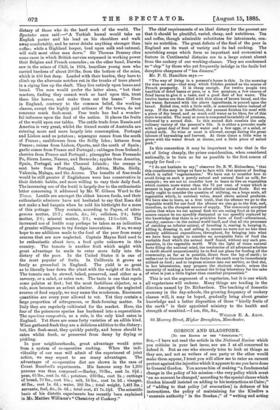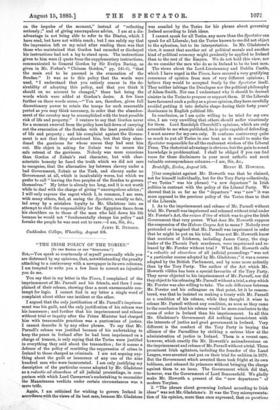GORDON AND GLADSTONE.
[TO THE EDITOR. OF THE " SPECTATOR."'
have not read the article in the National Review which you criticise in your last issue, nor am I at all concerned to defend it. But as one who sincerely tries to look at things as they are, and not as writers of one party or the other would make them appear, I trust you will allow me to enter an earnest protest against the injustice which it appears to me you have done to General Gordon. You accuse him of making "a fundamental change in the policy of his mission—the very policy which must
on no account be changed,' according to the special clause which Gordon himself insisted on adding to his instructions at Cairo;" of "adding to that policy [of evacuation] in defiance of his instructions, the policy of maintaining for the Khedive a suzerain authority ' in the Soudan ;" of " writing and acting on the impulse of the moment," instead of "reflecting seriously ;" and of giving unscrupulous advice. I am at a dis- advantage in not being able to refer to the Diaries, which I have read, but have not within reach; but I can safely say that the impression left on my mind after reading them was that those who maintained that Gordon had exceeded or disobeyed his instructions had not a leg to stand upon. The instructions given to him were (I quote from the supplementary instructions, communicated to General Gordon by Sir Evelyn Baring, as given in Mr. Forbes's "Chinese Gordon," pp. 245-6), "that the main end to be pursued is the evacuation of the Soudan." It was as to this policy that the words were used, " I understand that you entirely concur in the de- sirability of adopting this policy, and that you think it should on no account be changed," these last being the words which were added at Gordon's desire. A few lines further on these words occur,—" You are, therefore, given full discretionary power to retain the troops for such reasonable period as you may think necessary, in order that the abandon- ment of the country may be accomplished with the least possible risk of life and property." I venture to say that Gordon never for a moment swerved from the policy here laid down of carrying out the evacuation of the Soudan with the least possible risk of life and property ; and his complaint against the Govern- ment is not that they abandoned him, but that they aban- doned the garrisons for whose rescue they had sent him out. His object in asking for Zubair was to secure the safe retreat of the garrisons. Nobody was more conscious than Gordon of Zubair's real character, but with char- acteristic honesty he faced the truth which we did not care to recognise, that the alternative lay between slavery under a bad Government, Zubair or the Turk, and slavery under no Government at all, which is incalculably worse, but which we prefer to call " leaving the free peoples of the Soudan to govern themselves." My letter is already too long, and it is not worth while to deal with the charge of giving " unscrupulous advice ;"
I will only express the regret which I, in common, I am sure, with many others, feel, at seeing the Spectator, usually so fair, led away by a mistaken loyalty to Mr. Gladstone into an attempt to shift the responsibility for the Egyptian fiasco from his shoulders on to those of the man who laid down his life because he would not " fundamentally change his policy " and forsake the people he was sent out to save.—I am, Sir, &c., JAMES E. DENISON. Cuddesdon College, Wheatley, August 8th.



































 Previous page
Previous page